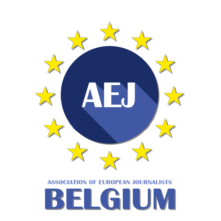By Benedetta Zimone

AEJ Belgium went to Aachen on 7 May to attend the final event of the European Charlemagne Prize. During the ceremony, several guests went onstage to reward the young participants. Among them was the vice-president of the European Parliament Marc Angel, whom we had the pleasure of interviewing at the end of the event.
In view of the upcoming European Elections, Angel highlighted the importance of promoting media pluralism in the European Union, since it is a fundamental pillar of modern democracies.
“We just voted for the Media Freedom Act, which is a legislation that underlines the importance of a free press and I think that’s very important,” he said.
Additionally, Angel pointed out the necessity to support public investment in the free press.
“We need to ensure that in schools, media education is part of the curriculum, especially for young people because they read news mainly through social platforms,” Angel explained.
Concerning social media, the Vice President of the European Parliament claimed that these social platforms need to be regulated, to avoid the spread of misinformation.
In this regard, he said: “Social media are important tools, but we have to regulate them and we did that with the Digital Services Act and Digital Market Act, where there’s a responsibility for the big platforms to immediately fight against misinformation, and if they are not supposed to do so, these big companies will have expansive fines.”
Indeed, these two legislations form a unique set of rules and laws which seek to create a safer digital space in which the fundamental rights of users are protected.
“The Digital Services Act is entering into force, and I hope it will be successful but, if not, we have to strengthen it because we have to make sure that what is illegal offline has to be illegal online,” he argued.
With these words, Angel referred to the fact that the Code of Conduct on countering illegal hate speech online has now been implemented in the new Digital Services Act package.
“We cannot let hate be spread over social media, I am happy that in the European Union, we now have a legislation which says that hate speech and hate crime online have to be on the list of euro crimes in every country, and this is also important to protect citizens,” he concluded.
The first prize of the 2024 edition went to the “Sisterhood Pathways” project from Lithuania. This project aims to fight domestic violence against women in the Baltic states through the use of art, social media campaigns, and local workshops. Moreover, it aspires to share useful techniques for preventing violence against women all over the world.
The European Charlemagne Prize is organised annually by the European Parliament and the International Charlemagne Foundation, which seeks to promote projects run by young people to foster the development of European identity and integration.
